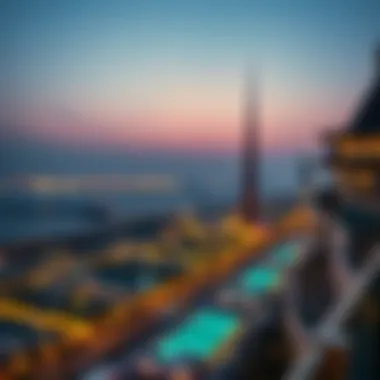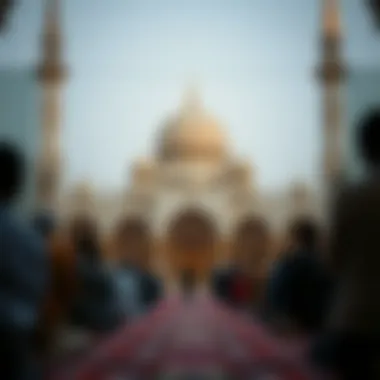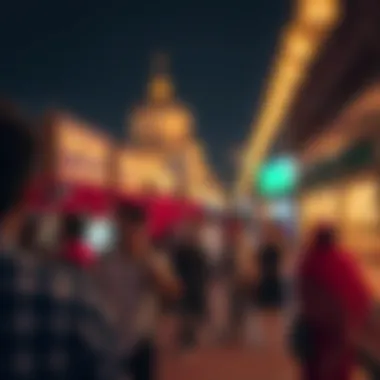Navigating the Ramadan Schedule in Dubai


Intro
Ramadan is more than just a month for fasting; it’s a period teeming with deep significance and a flurry of unique traditions. In Dubai, the effects of Ramadan can be felt in every corner, from bustling markets to quiet neighborhoods. As the sun sets, the call to prayer reverberates through the air, marking the end of a day spent in reflection and devotion. With the diverse population expatriates and visitors form a noticeable part of, understanding the intricacies of the Ramadan schedule is vital for smooth navigation through daily life during this sacred month.
From the timings of fasting to special hinterlands of cultural events, the Ramadan schedule influences everything, creating a tapestry of community, spirituality, and commerce.
Why Understanding Ramadan Matters
For those residing in or coming to the UAE during Ramadan, grasping its rhythms can enhance one’s experience significantly. The observances can shape social interactions, work schedules, and grocery shopping rhythms. It’s a vibrant period where the richness of Islamic traditions is showcased, allowing everyone to engage in the cultural landscape of Dubai. Whether you are a long-time resident or a first-time visitor, having insight into local customs can build bridges and foster mutual respect.
Over the coming sections, we will delve into the various elements of the Ramadan schedule in Dubai; we will discuss fasting times, prayer schedules, special events, and how the practice of Ramadan impacts societal engagements across the city. Together, these insights will equip you with the knowledge to navigate this significant time in the Islamic calendar.
The essence of Ramadan is not only in abstaining from food but in reaffirming connections with family, community, and faith.
Stay tuned to uncover how these elements intertwine with daily life in Dubai.
Prelims to Ramadan in Dubai
Ramadan is not just a month on the Islamic calendar; it serves as a pivotal period for the Muslim community. In Dubai, the atmosphere transforms significantly as the holy month approaches. This transformation is marked by a blend of spirituality, community bonding, and cultural richness. For both residents and expatriates, understanding the Ramadan schedule is essential. Not only does it affect daily routines, but it also shapes social interactions and business practices within the emirate.
The timing of fasting and prayers is central to daily life during Ramadan. The fast from dawn until sunset is a significant aspect that affects both schedules and social gatherings. By grasping the nuances of these timings, residents can better participate in the communal aspects of this month, such as Iftar, the meal that breaks the fast, and Tarawih prayers, which are special nightly prayers.
Moreover, this month is a time for considerable charitable activities. Understanding Ramadan in Dubai involves recognizing how the spirit of giving is woven into daily life during this time. Many organizations and individuals engage in acts of charity, offering meals to those in need and participating in community events.
The observance of Ramadan does pose unique challenges for expatriates who may be unfamiliar with local customs. They have to navigate their work schedules, dining options, and social etiquette during this time. Therefore, insight into the customs and timings can facilitate smoother integration and appreciation of local culture.
In summary, the significance of Ramadan in Dubai extends beyond mere fasting; it encapsulates an entire lifestyle that merges faith, culture, and community. Comprehending these elements helps both locals and visitors to embrace the month with respect and understanding, fostering deeper connections in this vibrant city.
Keywords:
Ramadan schedule, Dubai, Iftar, Tarawih prayers, fasting, community activities, expatriate experience, daily routines
For more information on the cultural context of Ramadan, please visit Britannica or Wikipedia.
Understanding these dynamics not only enhances personal experiences but also reflects an individual's respect for the traditions upheld within Dubai's multicultural society.
Historical Context of Ramadan
Ramadan holds a position of great significance in the Islamic tradition, serving as a period of reflection, devotion, and community for millions of Muslims around the globe. In examining the historical context of Ramadan, it becomes clear that this month is not merely a time of fasting but is steeped in rich cultural heritage and spiritual depth.
The origins of Ramadan can be traced back to the 7th century CE when the Quran, the holy book of Islam, was revealed to the Prophet Muhammad during this sacred month. This event is a cornerstone in Islamic faith, marking the beginning of an era that shaped the religious landscape of the Arabian Peninsula and beyond. Recognizing the roots of Ramadan allows for a deeper appreciation of its current practices and observances.
Understanding the historical context enriches three core aspects:
- Spiritual Importance: Ramadan is a time for Muslims to strengthen their faith. Fasting from dawn to dusk fosters empathy for the less fortunate, reminding believers of the struggles that many people face daily.
- Cultural Heritage: Rituals and traditions have evolved over centuries, reflecting diverse cultural identities while maintaining the essence of spirituality. Each community, whether it be in Dubai or elsewhere, adds its own flavor to the observance of Ramadan.
- Community Bonds: The historical evolution of Ramadan has also emphasized the importance of communal ties. Gathering for meals and prayers reinforces a sense of belonging, essential for social cohesion in culturally diverse cities like Dubai.
For expatriates and visitors in Dubai, understanding these layers adds to their experience during Ramadan. One becomes more aware of the underlying values, such as compassion and unity, that bind the community together during this month. This knowledge encourages respectful engagement with local customs, an essential aspect for anyone looking to immerse themselves fully within the society.
Moreover, events like the Night of Decree (Laylat al-Qadr), which is believed to occur within the last ten nights of Ramadan, highlight special moments of worship, prayer, and reflection. This night holds profound significance, as it commemorates the moment the Quran was first revealed.
In essence, the historical context of Ramadan influences how the observance is perceived and practiced today. For expatriates, understanding these nuanced traditions isn't just a formality; it becomes a bridge to connecting with the local community. It fosters a relationship built on respect and appreciation for the profound significance that this holy month carries for millions around the world.
To grasp the nuances of Ramadan is to embrace an integral part of Islamic faith and culture; it is a doorway to understanding the heart of a community.
Cultural Significance of Ramadan


Ramadan is more than just a month of fasting; it serves as the spiritual heart of the Islamic faith. In Dubai, a city that showcases a stunning blend of tradition and modernity, the cultural significance of Ramadan is elevated to an even greater level. The practices during this month offer profound insights not only into the faith of the Muslim community but also into the core values that define collective living and social harmony.
During Ramadan, Muslims prioritize reflection, empathy, and devotion. Fasting from dawn until sunset is a way to grow closer to Allah and better understand the trials that the less fortunate face. It’s a time when personal sacrifice becomes a communal responsibility, breaking down barriers between individuals and reinforcing a sense of solidarity.
Moreover, the cultural benefits extend beyond just religious observance. Activities like nightly prayers known as Tarawih, community meals, and charitable endeavors enhance connections within neighborhoods. The effect is palpable in bustling areas such as Al-Fahidi, where families come together, creating an atmosphere full of shared spirit and joy. Ramadan enables the community to come together, highlighting important social values such as generosity, kindness, and support for one another.
Special events, charities, and social gatherings often define the season in Dubai, shaping how individuals approach their everyday lives during this time. The cultural significance of Ramadan in Dubai offers a unique opportunity for expatriates and tourists to engage deeply with the local community, fostering understanding and appreciation of traditions that date back centuries.
"Fasting is not just about abstaining from food; it’s a holistic approach to understanding life, bringing compassion to the forefront of daily existence."
In summary, the cultural significance of Ramadan in Dubai lies in the way it bridges personal faith and community involvement, shaping both daily life and social connections. By participating in the observances and rituals, individuals, both local and expatriate, get a chance to broaden their perspective and create lasting bonds across cultures.
Daily Ramadan Schedule
The Daily Ramadan Schedule in Dubai is central to understanding how the holy month unfolds in this vibrant city. It serves as a comprehensive framework for both locals and expatriates, detailing the timings for the various daily rituals and activities that define the holy month. This structure is significant not just for its religious importance but also for its influence on daily life and community interactions.
During Ramadan, the daily schedule revolves around prayer times, meals, and community events that foster a deep sense of belonging and spirituality. Understanding this schedule is crucial, particularly for expatriates who may be experiencing their first Ramadan in Dubai. By acclimating to local customs and timings, they can integrate more seamlessly into the fabric of city life.
Fajr Prayer and Suhoor Timing
The day in Dubai during Ramadan begins before dawn with the Fajr prayer. This prayer marks the end of the last meal, known as Suhoor, which is taken just before fasting begins. The timing of Fajr prayer varies throughout Ramadan, typically falling between 4:30 AM and 5:00 AM. For many, Suhoor is a time to gather with family and friends, sharing a meal that sets the tone for the day ahead. As fasting entails refraining from food and drink until sunset, this meal is often hearty and nutritious. Common Suhoor dishes include:
- Dates and water for hydration and quick energy.
- Oatmeal or cereal to provide sustained energy.
- Eggs or cheese for protein.
Many residents realize the importance of maximizing this meal, as it not only sustains them during the long hours of fasting but also fosters a communal atmosphere among families. Therefore, it's worth noting that many eateries in Dubai open early to cater to those partaking in the pre-dawn meal.
Iftar Timing and Customs
As the sun sets, the call to Maghrib prayer signals that it's time to break the fast, known as Iftar. Typically, Iftar timing is around 6:45 PM to 7:00 PM, but it can vary slightly based on the sunset time. In Dubai, the moment of breaking the fast is often heralded by the sound of cannon fire, which adds a festive air to the evening.
Iftar is a celebrated occasion marked by an abundance of food and shared experiences. It's common to begin the evening meal by eating dates and drinking water, following the tradition of the Prophet Muhammad. Families often gather around the table, enjoying a variety of dishes, which may include:
- Lentil soup or harira (a traditional Moroccan soup).
- Shawarma or grilled kebabs with warm bread.
- Sweets like kunafa or baklava to satisfy the taste for something sweet after a long day.
Many restaurants and hotels also offer elaborate Iftar buffets, where both locals and tourists can indulge in traditional dishes, creating a truly communal atmosphere.
Tarawih Prayers
After Iftar, Muslims usually perform Tarawih prayers, which are special prayers held only during Ramadan. These prayers take place in the evenings and may be conducted at home or in mosques. In Dubai, some mosques, like the Grand Mosque in Jumeirah, become remarkably crowded during this time as believers seek to enhance their spirituality and community ties.
Tarawih prayers consist of extra units of prayer, typically 8 or 20 in number, depending on the mosque's tradition. The length and intensity of the prayer can vary, often lasting over an hour. The beauty of these prayers lies in their collective nature—individuals come together in unison, fostering a sense of solidarity and communal aspiration.
The experience of attending Tarawih prayers in mosques around Dubai is remarkable; the ambiance, especially with the recitation of the Quran, can be profoundly moving. Moreover, the experience varies from mosque to mosque, each providing its atmosphere and community vibe—some filled with the sound of harmonized prayers, others bursting with local culture and traditions.
Overall, the Daily Ramadan Schedule offers a structure that encapsulates the essence of Ramadan in Dubai. Each component—from Suhoor to Iftar, and then to Tarawih—is interwoven with cultural significance, deepening connections among families and communities, and enhancing the spiritual journey of the faithful.
Impacts on Daily Life in Dubai
The holy month of Ramadan brings about considerable shifts in the daily routine of residents and expatriates in Dubai. Understanding these impacts is crucial for anyone navigating life in this vibrant city during this time. The Ramadan schedule influences not only individual habits but also alters the dynamics within communities, businesses, and social interactions.
Working Hours Modifications
During Ramadan, the regular working hours in Dubai tend to be adjusted to accommodate fasting schedules. Most government offices operate reduced hours, often starting later in the morning and ending in the early afternoon. Private sector companies follow suit, though the specifics can vary. It's common to see shifts from the typical 9-to-5 format to a more flexible 10-to-3 or similar arrangement.
- Stakeholders Need to Adapt: This is particularly relevant for expats and professionals who need to align their work schedules with local customs. Some workplaces implement a remote working policy or allow employees to work from home to ease the strain of fasting during work hours.
- Importance of Flexibility: Adapting to these work modifications can greatly impact productivity and morale. Keeping channels of communication open and being flexible can yield a smooth workflow even amid significant changes.


In addition to business hours, it’s essential to note how traffic patterns shift during this month. There tends to be heavier congestion during late afternoon hours, as residents rush to reach their homes or restaurants for Iftar. Understanding these trends can prevent unnecessary delays for those commuting throughout the city.
Dining and Social Etiquette
Observing Ramadan also comes with specific dining and social etiquette that underscores the month’s significance. For families and communities, evenings become alive with gatherings and community spirit, especially around meal times. Here are some fundamental aspects:
- Respect for Fasting: It’s important for expatriates and visitors to be mindful of those who are fasting. Eating, drinking, or smoking in public during daylight hours can be seen as disrespectful. Some establishments do remain open, but out of courtesy, many choose to avoid consuming food or beverages in public view until after sunset.
- Social Gatherings: Iftar meals after sunset are a pivotal part of Ramadan. Sharing food with family, friends, and those in need strengthens communal bonds. Numerous hotels and restaurants offer lavish Iftar buffets, showcasing traditional dishes like dates and iftar juices, which serve to replenish energy after a long day of fasting.
- Invitations to Iftar: It's not uncommon for locals to invite friends and colleagues for Iftar. Accepting such invitations fosters goodwill and encourages cultural exchange. Being gracious in these situations is paramount, as is the expression of gratitude for hospitality.
Even beyond meal times, the shift in social dynamics emphasizes a sense of unity and compassion, as communities come together not only for breaking fast but also to partake in charitable activities, which are heightened during this month.
"Ramadan is not just about refraining from food; it’s about cultivating empathy and understanding, both toward oneself and the broader community."
In summary, the impacts on daily life during Ramadan in Dubai are manifold. From altered work schedules to dining etiquette, these changes reflect the deep cultural roots of the holy month and provide valuable insights for those participating in or navigating this unique period in the emirate.
Iftar Experiences in Dubai
Iftar holds a special place in the hearts of people in Dubai. Each day during Ramadan, when the sun sets, the fast is broken with this evening meal called Iftar. It is not just about indulging in delicious food; it encapsulates a sense of community and togetherness. Whether you are a local, an expatriate, or just visiting, experiencing Iftar in Dubai is a unique opportunity that opens up the city's rich cultural tapestry.
The importance of Iftar experiences in Dubai goes beyond simply breaking the fast. It serves as a time for families, friends, and colleagues to gather and share meaningful moments. The meals typically consist of a variety of traditional dishes and beverages that reflect the diverse culinary influences found in the UAE. Engaging in Iftar allows individuals to connect with customs and traditions, fostering a shared respect for the month of Ramadan.
As communities join in the celebration, Iftar becomes a vivid expression of hospitality. Restaurants, hotels, and even private homes prepare lavish spreads that cater to all tastes. Notably, this celebration includes both formal events at upscale venues and informal gatherings in residences. Learning about these experiences sets the stage for understanding how they shape social interactions during this holy month.
Traditional Dishes and Beverages
Breaking the fast is a sensory experience, especially with the array of traditional dishes that grace Iftar tables across Dubai. Dates, often the first item to break the fast, have significant importance in Islamic tradition. Freshly harvested dates are not only sweet but also packed with nutrients, making them the perfect choice to regain energy after a day of fasting.
The traditional soup, Luqaimat, a delicious sweet dumpling drizzled with syrup, is widely beloved throughout the region. Additionally, dishes such as Shorbat Adas, a hearty lentil soup, are prevalent starter items on many dining tables. When it comes to main courses, options range from Mandi, a spiced rice dish, to Kebabs of various kinds. These dishes not only satiate hunger but also offer a rich taste of local culture.
Accompanying these meals, beverages like Qamar Al-Din (apricot juice) and Jallab (a mix of dates, raisins, and water) come highly recommended for their refreshing properties after fasting all day. These drinks have become staples during Ramadan, enhancing the Iftar experience and complementing the culinary spread.
Public Iftar Events
During Ramadan, Dubai transforms into a mosaic of communal events, with public Iftar gatherings becoming a popular attraction. These events often take place in parks, community centers, and even in lavish tent setups. They exemplify the spirit of camaraderie by inviting individuals, families, and even tourists to share a meal.
Many organizations and mosques host large Iftar events, making it accessible for anyone to join. Public Iftars can range from simple gatherings where communal tables are lined with dishes to extravagant celebrations featuring live music and entertainment. The experience is not only about food but also about witnessing the vibrancy of community spirit.
Such events often offer an opportunity for charitable initiatives as well, where attendees can contribute to local causes. Participating in one of these public Iftars can leave a lasting impression, fostering a greater understanding of the diverse cultures present in Dubai.
Special Events During Ramadan
During the holy month of Ramadan, the vibrancy of Dubai truly shines through its numerous special events. These activities not only enhance the spirit of the month but also provide a unique opportunity for the local community and expatriates to come together. The festive atmosphere is palpable, with events that reflect the cultural richness of the region while facilitating the exchange of traditions.
Cultural Festivals and Markets
Cultural festivals and markets play a significant role in celebrating Ramadan in Dubai. They are perfect for anyone looking to immerse in the local culture. During this time, various venues transform into colorful marketplaces filled with traditional crafts, artwork, and delectable food.
- Global Village hosts an annual Ramadan festival, which showcases international cultures through food stalls and entertainment. Visitors can sample traditional dishes from across the globe, all while enjoying live performances.
- Ramadan Night Markets pop up across the city where vendors sell everything from handmade artisan goods to local delicacies. These markets not only provide a unique shopping experience but also allow for community interaction, fostering a sense of belonging.
- Monthly cultural events at Dubai Opera, featuring traditional performances, offer expatriates and residents a chance to understand the deeper significance of Ramadan through music and art.
Food plays a central part here as well. You can taste dishes that are specifically prepared for iftar, the meal to break the fast. Often, booths highlight the uniqueness of Emirati cuisine with items like harees and khameer bread.
"These events are not just about the food or shopping; they capture the essence of unity and respect that Ramadan nurtures within us all."
These festivals echo the generosity associated with Ramadan, providing insight into how the community engages with the spirit of giving.
Charitable Activities and Giving


Charitable activities are an intrinsic part of Ramadan in Dubai, strongly underpinning the values of compassion and generosity that define the holy month. Many organizations and charities ramp up their efforts during this period, seeking to make a tangible impact on the lives of those in need.
- Donation Drives: Local mosques and community centers facilitate various donation drives, collecting food, clothes, and money. It’s a wonderful opportunity for expatriates to contribute, help local initiatives, and engage with the community.
- Iftar Sponsorship Programs: Many companies sponsor iftar meals for workers and the less fortunate. These initiatives allow businesses to give back while reinforcing their commitment to corporate social responsibility.
- Volunteer Opportunities: Expatriates looking to give back can find numerous volunteer opportunities during Ramadan. Numerous organizations are in dire need of extra hands for their charitable events.
In Dubai, one often see’s communities rallying together to pack food parcels for those in need, create hygiene kits for underprivileged families, or organize educational workshops for the youth. These acts not only reinforce the importance of Zakat (charitable giving) but also foster an environment where the elderly, children, and families feel valued and supported.
Engaging in charitable activities during Ramadan allows expatriates to integrate into local society while demonstrating that compassion crosses all borders. Overall, these special events add rich layers to the experience of Ramadan in Dubai, highlighting the month’s spiritual significance while nurturing community ties.
Navigating Life as an Expat During Ramadan
Living as an expatriate in Dubai during Ramadan can be both a rewarding and challenging experience. As this month-long period unfolds, those coming from various global backgrounds must adapt to a unique rhythm that governs daily life. The transition involves embracing local customs, fostering respect for traditions, and navigating the extensive cultural tapestry of Islamic practices.
Understanding the nuances of Ramadan in Dubai is essential for expatriates. It sheds light on the local mindset and helps facilitate meaningful interactions within the community. Embracing the local culture during Ramadan does not only signify respect but also opens doors to genuine relationships and a deeper appreciation for this significant cultural experience.
Adjusting to Local Customs
Adjusting to local customs during Ramadan is paramount for expats living in Dubai. For those not accustomed to fasting, the very concept can be foreign. Fasting from dawn until sunset is a religious observance that demands a significant adjustment in daily routines. It's crucial to understand that during this holy month, food and drink are not part of the daytime activities.
When it comes to dining etiquette, expatriates are encouraged to be mindful. Many establishments may have altered hours or offer limited menus during the day. Moreover, being caught with food or drinks in public can be viewed as disrespectful. Thus, it’s good practice to familiarize oneself with restaurant timings and observe local etiquette when it comes to food consumption.
"Mindful adjustments pave the way for fostering respect and understanding among cultures."
Additionally, participating in local customs can enhance the experience. This might involve attending community iftars or local gatherings when the fast is broken at sunset. Engaging in these events not only enriches one’s cultural understanding but builds camaraderie with neighbors and colleagues.
Respecting Traditions and Faith
Respecting traditions and the faith central to Ramadan is non-negotiable for a harmonious existence as an expat in Dubai. Voice intonations and behaviors communicate respect; therefore, it’s imperative to demonstrate sensitivity. Being aware of prayer times, especially the five daily prayers, showcases cultural appreciation. It’s routine for many establishments to pause business during these intervals, reflecting the importance of faith in everyday life.
Understanding the significance of the Holy Month is also vital. Ramadan is not simply about fasting; it’s a time of reflection, spirituality, and community. Educating oneself on these values can lead to deeper connections with local friends and colleagues, who often appreciate discussions surrounding the meanings and practices of Ramadan.
In summary, successfully navigating life as an expat during Ramadan requires an open heart and a willingness to learn. Adjusting to customs and respecting local traditions not only fosters good relationships but also enriches one’s own life experience in this vibrant city. By embracing the spirit of Ramadan, expats contribute to a sense of community, transforming a personal undertaking into shared cultural appreciation.
The End: The Essence of Ramadan in Dubai
As the holy month unfolds in Dubai, the air thickens with a blend of spiritual reflection, community bonding, and cultural expression. Ramadan is more than just fasting; it serves as a profound reminder of the faith, discipline, and unity that characterizes the Muslim community. For those who live or work in Dubai, understanding the essence of this period is vital, not only to adapt to the unique rhythms of life but also to appreciate the rich tapestry that Ramadan weaves into the fabric of the city.
Community Engagement
The true spirit of Ramadan comes alive through its communal aspects. Families and friends gather for Iftar, the evening meal that breaks the fast, sharing traditional dishes and heartfelt conversations. This social engagement fosters connections and strengthens community ties. Investors and expatriates should consider these events not just as cultural experiences, but as opportunities to forge relationships that can enhance both personal and professional networks. The Arabic saying, "A shared meal is a shared heart," captures this sentiment perfectly.
Reflection and Spiritual Growth
For many, Ramadan is a time for introspection. The long hours of fasting encourage individuals to contemplate their purpose and values while fostering a deeper connection to their faith. Engaging in prayer and reading of the Quran are central components of this month, offering a pathway to spiritual rejuvenation. Residents and expatriates alike are invited to reflect on their own beliefs and consider how these practices resonate with their life experiences.
Cultural Awareness and Respect
Navigating Ramadan in a city as dynamic as Dubai necessitates cultural sensitivity. Expatriates and visitors are advised to be mindful of local customs, practicing restraint during daylight hours. Respecting the fasting tradition not only demonstrates courtesy but also paves the way for positive interactions with the local population. It’s a simple yet powerful step towards fostering mutual respect and understanding across cultures.
Economic and Social Benefits
On an economic front, Ramadan brings forth various opportunities. As businesses adapt to altered working hours and dining practices, savvy investors might find avenues for growth and collaboration. Special Ramadan offers in hospitality, retail, and cultural sectors create unique business dynamics. For homeowners, understanding these trends can lend insight into the market’s pulse during this significant month.
In summation, Ramadan in Dubai isn’t merely about the act of fasting; it's about enriching one’s life through community, spirituality, and cultural respect. Each year, as the crescent moon rises, a chance is presented to all — expatriates, locals, and visitors alike — to experience a month that stimulates both the body and the soul. By embracing the essence of Ramadan, one can deeply connect to Dubai’s culture, nurturing understanding, and respect among diverse communities.
"The beauty of Ramadan is not in what you eat or drink but in how you celebrate your faith together."
As the month draws to a close, the learnings and memories garnered become lasting legacies. Thus, it becomes clear that to truly navigate life during this holy month is to recognize that immersion in its values enhances both personal growth and societal harmony.
For more information on Ramadan and its cultural significance, you can visit:
Engaging with the spirit of this month provides insights that go beyond religious observance; it reflects a commitment to understanding the deeper values within our shared humanity.











